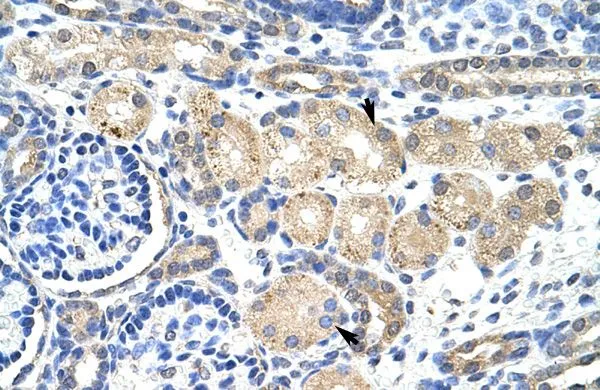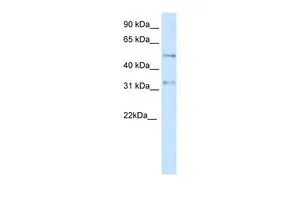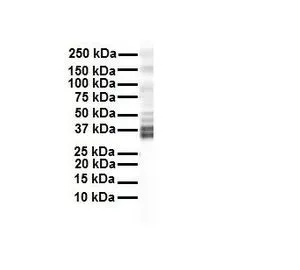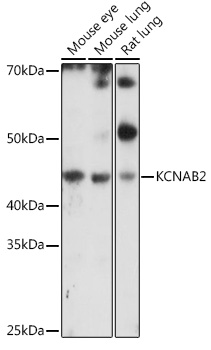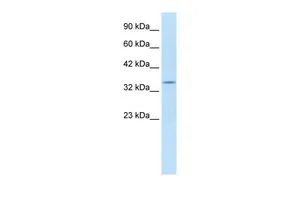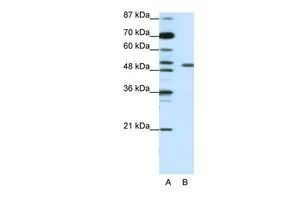
WB analysis of Jurkat cells using GTX47448 KCNAB2 antibody at 0.2-1μg/ml.
Lane A : marker
Lane B : Jurkat cells
KCNAB2 antibody, Internal
GTX47448
ApplicationsWestern Blot, ImmunoHistoChemistry, ImmunoHistoChemistry Paraffin
Product group Antibodies
ReactivityHuman, Mouse
TargetKCNAB2
Overview
- SupplierGeneTex
- Product NameKCNAB2 antibody, Internal
- Delivery Days Customer9
- Application Supplier NoteWB: 0.2-2.5 ug/ml. IHC-P: 2-10 ug/ml. *Optimal dilutions/concentrations should be determined by the researcher.Not tested in other applications.
- ApplicationsWestern Blot, ImmunoHistoChemistry, ImmunoHistoChemistry Paraffin
- CertificationResearch Use Only
- ClonalityPolyclonal
- Concentration0.5-1 mg/ml
- ConjugateUnconjugated
- Gene ID8514
- Target nameKCNAB2
- Target descriptionpotassium voltage-gated channel subfamily A regulatory beta subunit 2
- Target synonymsAKR6A5, HKvbeta2, HKvbeta2.1, HKvbeta2.2, KCNA2B, KV-BETA-2, voltage-gated potassium channel subunit beta-2, K(+) channel subunit beta-2, potassium channel, voltage gated subfamily A regulatory beta subunit 2, potassium voltage-gated channel, shaker-related subfamily, beta member 2
- HostRabbit
- IsotypeIgG
- Protein IDQ13303
- Protein NameVoltage-gated potassium channel subunit beta-2
- Scientific DescriptionVoltage-gated potassium (Kv) channels represent the most complex class of voltage-gated ion channels from both functional and structural standpoints. Their diverse functions include regulating neurotransmitter release, heart rate, insulin secretion, neuronal excitability, epithelial electrolyte transport, smooth muscle contraction, and cell volume. Four sequence-related potassium channel genes - shaker, shaw, shab, and shal - have been identified in Drosophila, and each has been shown to have human homolog(s). This gene encodes a member of the potassium channel, voltage-gated, shaker-related subfamily. This member is one of the beta subunits, which are auxiliary proteins associating with functional Kv-alpha subunits. This member alters functional properties of the KCNA4 gene product. Alternative splicing of this gene results in multiple transcript variants encoding distinct isoforms. [provided by RefSeq, Dec 2010]
- ReactivityHuman, Mouse
- Storage Instruction-20°C or -80°C,2°C to 8°C
- UNSPSC41116161

